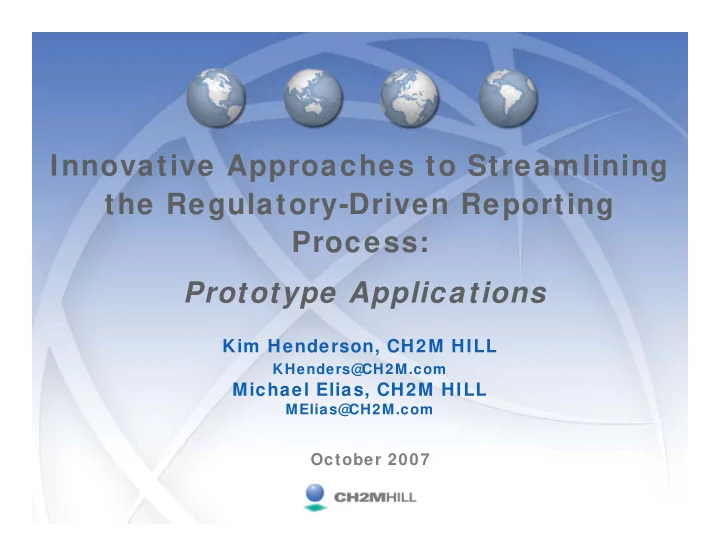

Innovative Approaches to Streamlining the Regulatory-Driven Reporting Process: Prototype Applications Kim Henderson, CH2M HILL KHenders@ CH2M.com Michael Elias, CH2M HILL MElias@ CH2M.com October 2007
Presentation Overview � Overview and approach to streamlining � Benefits � Prototype demonstrations � Challenges and solutions � Future possibilities
Why Streamline? � Typical hard copy deliverables are lengthy, highly technical, and too complex for target audience � DoD and EPA formed a joint Task Force to develop streamlined procedures and expedite site closure at federal facilities
Why Streamline? (con’t) � Consistent with: – The President’s Management Agenda, Fiscal Year 2002 � Directed government agencies to implement better business management practices to provide costs and time savings using electronic enhancements – Section 3504(a)(1)(B)(vi) of Title 44, US Code � "(vi) the acquisition and use of information technology, including alternative information technologies that provide for electronic submission, maintenance, or disclosure of information as a substitute for paper"
Goal for Streamlining � To produce documents that: – Are more concise and easier to read – Reference detailed or complex technical information – Are understood by a broader audience – Use modern information management technology – Expedite regulatory review and decision-making – Are cost-effective
What is a Streamlined Document? � Streamlined hard copy document with electronic deliverable (CD) – Self-launching – Free-ware – Interactive – Graphically oriented – Easily navigable
Benefits � Significantly reduced document size – 300 pages vs. 30 pages – Minimize text, focus on graphic presentation � Global time/cost savings – Reduction in review time – Reduction in document size
Benefits (con’t) � Higher quality document Concise language – Considers public review – and understanding Intuitive and easily – navigable format � Support from DoD and regulatory agencies Consistent with guidance – and regulatory requirements � Provides more information than a typical hard copy document
Prototype 1: sROD Streamlined Record of Decision (sROD) Operable Unit 6, Site 12, MCAS Cherry Point, North Carolina
sROD Background � ROD is a legal document that certifies the remedy selection process in accordance with CERCLA and the NCP – Summarize background info and rationale contained in the Administrative Record – Provide information necessary for determining engineering components and outline objectives and cleanup levels for the selected remedy – Key communication tool for the public that explains contamination problems that the remedy seeks to address and the rationale � Using EPA Guidance on preparing RODs results in 300-600 page documents
sROD Document Design and Layout � Hard copy – 20-50 page document depending on complexity of the site – Use of graphic summary tables and figures to minimize text – Reference previous documents in Administrative Record � CD – Cross referenced phrase corresponds to hyperlink on interactive CD – Interactive CD provides easy access to reference information for review
sROD Demonstration
Prototype 2: eBERA Electronically Enhanced Baseline Ecological Risk Assessment (eBERA) Blows Creek, St. Juliens Creek Annex, Chesapeake, Virginia
eBERA Background � Blows Creek – Estuary to Southern Branch of the Elizabeth River – Potentially impacted watershed encompasses 313 acres, with multiple landowners � Evaluation encompasses multiple rounds of data and contaminant sources � BERA represents final evaluation of ecological risk and is a basis for remedial decisions
eBERA Document Design and Layout � Increased level of interactivity relative to streamlined ROD � Information presented in tiered format to facilitate navigation – Detail increases with each subsequent tier – Tiers logically hyperlinked to subsequent level
eBERA Document Design and Layout (con’t) � Streamlined text First Tier � Text-based hyperlinks to figures/tables and supporting documentation Second Tier Third Tier
eBERA Document Design and Layout (con’t) First Tier � Visually oriented � Focuses on interactive summary tables and figures Second Tier with clickable information boxes � Hyperlinks to third tier and supporting Third Tier documentation
eBERA Document Design and Layout (con’t) First Tier Second Tier � Summary tables and raw data Third Tier � Limited interactivity � Few hyperlinks
eBERA Demonstration
Challenges and Solutions � Non-traditional format – Work closely with project management team to communicate project approach and goals, and to manage expectations � Some users/reviewers may be resistant to electronic format – Supporting documentation includes instructions for use – Provide user ability to easily access compiled hard copy document – Security settings on some computers created minor challenges (trouble shooting instructions added)
Challenges and Solutions (con’t) � Requires well-coordinated effort between technical team, graphic designers, and computer information architects – Integrate project development/design team early and throughout process – Manage number and type of interactive figures – Initial development is more expensive, but creates template for long term cost savings
Challenges and Solutions (con’t) � Reviewer may not differentiate between new and historic materials – Clarify upfront what supporting material has been finalized � May not be appropriate for all sites – Small sites – Security issues that prevent the use of site pictures
Status and Future Applications � sROD and eBERA have been accepted as final by regulatory community � Electronically enhanced approach can be used for a broad range of documents � Approach can be easily adapted to meet with differing objectives and scopes
Questions and Comments Kim Henderson, CH2M HILL KHenders@ CH2M.com Michael Elias, CH2M HILL MElias@ CH2M.com
Recommend
More recommend